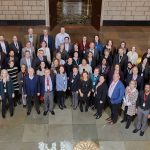This week, we learn that the journal Transplant International will transition to a gold open access model and that PLOS authors will now be able to submit articles to the publishers’ five newest journals directly from preprint servers. Meanwhile, we learn that Crossref will integrate Research Organization Registry identifiers and how the use of altmetrics may help remove gender bias in performance assessment metrics. Finally, we hear about open access tools in the energy sector and whether the Plan S Rights Retention Strategy may have unexpected legal consequences.
Transplant International going for gold via Frontiers Science News | 5-minute read
The European Society for Organ Transplantation has this week revealed that its flagship journal Transplant International will transition to gold open access from January 2022. This accompanies a move from publishing giant Wiley to open access publisher Frontiers. The transition, which will be compliant with Plan S, will grant researchers permanent access to future and archived Transplant International content. The journal publishes both key basic science and clinical developments in organ replacement medicine.
PLOS journals to allow direct submission of preprints via The Official PLOS Blog | 2-minute read
PLOS’ five new journals, launched earlier this year, will now integrate with the Cold Spring Harbor Laboratory preprint servers bioRxiv and medRxiv. Authors will be able to submit their research to PLOS Climate, PLOS Digital Health, PLOS Global Public Health, PLOS Sustainability and Transformation and PLOS Water directly from the two preprint servers. The bidirectional links between PLOS journal articles and bioRxiv and medRxiv preprints will increase the credibility of preprints and save time for authors.
Crossref to integrate ROR IDs via Crossref | 4-minute read
Crossref metadata will now include Research Organization Registry (ROR) IDs. ROR is a community-led project that aims to assign a unique and persistent identifier to every research organization in the world. A related initiative – the Global Research Identifier Database (GRID), which provided the initial seed data needed to establish ROR – ‘passed the torch’ over to ROR earlier this month. Crossref members who have been using GRID will soon need to consider using a ROR ID. A Crossref and ROR webinar will be available to Crossref members on 29 September 2021.
Altmetrics free of gender bias via The Publication Plan | 2-minute read
Alternative metrics, such as the Altmetric Attention Score (AAS), measure the impact of a publication by the amount of attention it receives online via news sites, social media and other platforms. While traditional performance evaluation metrics such as citation count tend to disproportionately favour men, the use of the AAS to measure research impact has been shown to remove gender bias. The AAS could be used alongside traditional methods to ensure a fairer research performance assessment.
Open science in the energy sector via Revolve | 10-minute read
Energy production and consumption reform is urgently needed to help curb global temperature rises. This article looks at recent approaches to overcoming the barriers to data access in the energy sector. One ongoing project, a Horizon 2020-funded management tool for open data called EnerMaps, centralizes and quality checks open energy research. EnerMaps follows FAIR (Findability, Accessibility, Interoperability, and Reuse) data principles and, to facilitate open collaboration and discussion, it will be linked to the Kialo social network. Open access to energy data will help researchers and other stakeholders plan and implement energy saving projects.
Is the Rights Retention Strategy too good to be true? via The Scholarly Kitchen | 6-minute read
In this guest blog post, Shaun Khoo, founder of Episteme Health Inc., a non-profit association that provides free open access neuroscience publishing, scrutinizes Plan S’s Rights Retention Strategy (RRS). The RRS allows authors to retain the copyright to their author accepted manuscripts by applying a Creative Commons Attribution (CC BY) licence to their work. Shaun argues that these open copyright licencing declarations encouraged by the RRS may conflict with publisher licencing obligations. These conflicts could potentially cause legal disputes between funders and publishers.
We at Open Pharma would like to continue to encourage all our readers to look after themselves and their community and to continue to follow advice from their country’s government and health organizations.
Coronavirus mental health and well-being resources:






